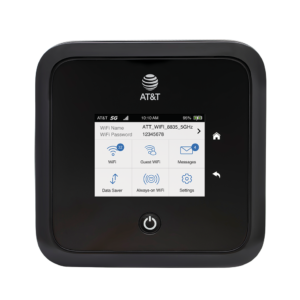A mobile hotspot device is the next best option for connecting while traveling in your RV. There are two types of mobile hotspots: cellular data plans through your existing cell provider and mobile phone (often called tethering) or a separate hotspot device that will need its own data plan but will provide better speeds, better signal, and allow more devices to connect.
Both mobile hotspots use a cellular data network to access the internet and then broadcast it to your other devices, such as laptops and tablets, through a localized Wi-Fi network. Depending on the mobile provider, they may require you to sign up for a separate mobile hotspot plan with limited data if not included with your mobile plan.
Note: If you plan to binge-watch your favorite shows and play video games often, you can expect to upgrade to the highest data plan your provider offers and still have the potential to experience speed throttling.
Let’s talk about mobile hotspot plans. They’re convenient because they use your smartphone and turn your cellular data into a Wi-Fi network you can connect all your devices.
With a mobile hotspot, you have many carrier options to fit your needs.
T-Mobile offers the most comprehensive 5G coverage of any cellular network hotspot plan, with speeds 2x faster than competitors. Their base plan is also very affordable, at only $10 per month, with 2GB of premium data included and free data roaming. Because of its availability, we recommend T-Mobile for RV life.
Next in line for reliability is the Verizon Pro plan. This Verizon plan is more expensive than T-Mobile but offers 100GB of 4G LTE or 5G data before speed throttling. This plan is excellent for those who use a relatively high quantity of data monthly. If you travel in your RV with family or friends and want to stream on multiple devices, this is the plan for you.
AT&T provides a prepaid hotspot data plan starting at $55 per month for 50GB, after which the speed will slow exponentially. If you have a set estimate on how much data your internet habits use per month, prepaid plans are an excellent option to avoid overpaying for data you won’t use.
Visible (owned by Verizon) offers a prepaid phone data plan called Visible+, which starts at $35 per month. This plan provides unlimited hotspot data at 5Mbps, so that speeds will be slow but never capped. Only one device can be connected to the hotspot at a time, so this plan is better suited to single RVers or those who don’t mind the inconvenience of taking turns.
Simply put, a mobile hotspot device is a small, portable physical device that uses the same process your mobile hotspot plan does to connect you to the internet. Instead of the Wi-Fi signal coming from your smartphone, it emits directly from a dedicated hotspot device.
Mobile hotspot devices and plans may perform the same function, but there are some clear pros and cons to why you would choose one or the other. For example, a hotspot plan uses your smartphone to share Wi-Fi, so they’re known to drain your phone battery quickly. Another issue is whether you must use your phone and other devices simultaneously. In that case, opting for a hotspot device would be a good idea. Hotspot devices free up your phone, still give you a Wi-Fi connection, and can be plugged in to charge constantly.
A mobile hotspot device can also support connecting more devices to Wi-Fi than a hotspot data plan, with potentially faster speeds and a more reliable connection. A hotspot device is an excellent option if you have family and friends traveling in your RV with you, so everyone can stay connected (and not argue over who gets to watch YouTube).
Reminder: Before you decide on a hotspot device or plan, keep in mind that you will have to purchase the physical device in addition to your monthly fee, so up-front costs will be higher than for a hotspot plan.

